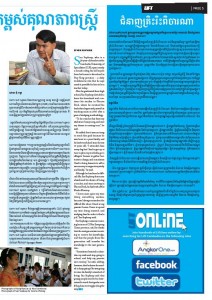Social
now browsing by category
Critical/Analytical Thinking
Critical Thinking
One of the crucial goals of education is to permeate critical thinking for students. You are engaging in process of critical thinking when you weigh evidence, analyze points of view, and evaluate the outcomes of a decision. Critical thinking requires you to judge thing reasonably about issues by considering evidence and using clear criteria to guide your decisions. Those criteria including consider all relevant evidence, develops criteria for making reasoned judgments, make judgments on the basis of these criteria, and works on developing the character traits, or habits of mind that promote effective decision making.
Actually, you make choices every day — at school, at home, with friends, and at work. For example, you may need to decide whether to join an after-school activity, whether to support a friend in demonstration, or how to plan your courses for the year.
Utilizing criteria to guide your decisions will help you achieve in school. Furthermore, the benefits of utilizing criteria to guide your decisions go well beyond the social studies classroom. Developing effective criteria will ensure that you make the most effective choices when faced with challenges in all aspects of your life.
Habits of Mind
Habits of mind to promote critical thinking and effective decision making are essential. Whether you are completing a social studies assignment or dealing with other challenges, these habits of mind can help you achieve success at school and in life.
What habits of mind or critical thinking you have pursued?
Posted in Culture, Education, Researches, Social | 5 Comments »
Letter from Abroad: Struggling Life
 It’s February in Canada and the temperature is below the freezing point. The people are shaking in the cold, harsh winter wind and the ground is entirely covered by a thick layer of white ice. Pheak Kdey, who is 30-years-old, drives his BMW through the blistering cold every day to work at his gas station. But today, he is taking time to join a meeting with other ethnic Cambodians to discuss their action plan for 2010.
It’s February in Canada and the temperature is below the freezing point. The people are shaking in the cold, harsh winter wind and the ground is entirely covered by a thick layer of white ice. Pheak Kdey, who is 30-years-old, drives his BMW through the blistering cold every day to work at his gas station. But today, he is taking time to join a meeting with other ethnic Cambodians to discuss their action plan for 2010.
The six-strong Khmer Youth Association of Alberta has contributed substantially to its community since it was founded in 1994 in Calgary, a sprawling city in western Canada. Pheak Kdey, who migrated from a border camp in 1983 during the civil war in Cambodia, was raised and educated here, and now runs a family business.
Pheak Kdey is one of many young Cambodians who have grown up in a foreign country, and he said that this hasn’t always been easy. “My parents had a difficult time adapting to a new life in an unfamiliar culture, surrounded by people speaking a foreign language,” he said. “But I enjoyed making new friends at school, and I became a coordinator between my parents and other people in our community.” After graduating from high school, Pheak Kdey began working at a gas station and seven years later, he was the station’s owner.
Read More …
Posted in Culture, Education, Social, Tourism | 2 Comments »
Young Khmers abroad and the Khmer music
Letter from abroad 10-03-2010
You might be curious to know what young Khmers living abroad choose to do to entertain themselves in their free time. Surprisingly, many of them choose to listen to the same Khmer pop and karaoke music that is so popular in the Kingdom.
While riding in his car, I noticed that my friend Patrick owned a number of Khmer CDs, ranging from oldies to modern songs. “I have always listened to Khmer songs,” said 23-year-old Patrick Meas, who has lived in Alberta since he was very young. “Preap Sovat is my favourite singer.”
Considering that he has lived most of his life away from Cambodia, as a Canadian citizen, it is incredible to see that Patrick can sing “Beautiful Girls” in Khmer.
While the song was originally sung by Jamaica-American rapper Sean Kingston, it is very popular in Canada and has been repeatedly played on the radio here. The fact that an American song was translated into Khmer and now is being sung by Canadians shows the intermingling of cultures around the world.
Read More …
Posted in Culture, Education, Social | 3 Comments »
Bridging the poverty gap
Dear Editor,

Economist and Nobel laureate Eric S Maskin speaks with the Post at the Hotel Cambodiana last week.
I agree with Professor Eric Maskin, who says that Cambodia has been at risk from a growing gap between rich and poor (“Nobel laureate to push PM on school reform”, January 20).
An unbalanced distribution of the wealth of the nation has worried many scholars besides Maskin, including David Jonathan Gross, who is also a Nobel laureate.
Cambodia can be viewed from two perspectives: progressive by comparison and progressive in actuality. If we compare the Kingdom to the past, we can see that anti-colonialism, the Cold War and globalization have played a significant role in Cambodia’s recent history.
The era of Lon Nol and Pol Pot must be evaluated in light of global cold war politics and the opposition between communism and democracy. Cambodia had no peace during this period, and the intractable conflicts led to mass killings and foreign intervention.
Though the media have focused considerable attention on this part of the Kingdom’s history, qualitative and quantitative progress since that time has sometimes been overlooked.
Read More …
Posted in Economics, Education, Politics, Social | 2 Comments »















